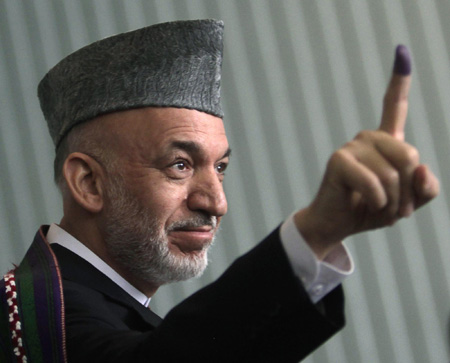|

Afghan President Hamid Karzai holds up his inked stained finger after voting in the presidential election in Kabul August 20, 2009. Streets in Afghanistan were mainly quiet and tense early on Thursday as Afghans awoke and headed to the polls for an anxiously awaited presidential election that Taliban fighters have vowed to disrupt with attacks. [Agencies]

|
KABUL: Afghans voted under the shadow of Taliban threats of violence Thursday to choose their next president for a nation plagued by armed insurgency, drugs, corruption and a feeble government nearly eight years after the US-led invasion.
Turnout, particularly in the violent south, will be key to the vote's success — the country's second direct presidential election. Taliban militants have pledged to disrupt the vote and circulated threats that those who cast ballots will be punished.
Early indications in Kabul pointed to a low initial turnout, perhaps as people assessed whether casting ballots was safe. An Associated Press reporter who visited six polling centers in the capital said he saw no lines at any of them.
"Yes, we are going to vote," Abdul Rahman, 35, said as he stood 50 yards (meters) outside one polling center. He and his friends were waiting to see a line of people vote safely before casting ballots. "If anything happens to the polling center, we don't want to be too close to it."
President Hamid Karzai, who has held power since the Taliban was ousted in late 2001, is favored to finish first among 36 official candidates, although a late surge by former Foreign Minister Abdullah Abdullah could force a runoff if no one wins more than 50 percent.
Scattered reports of minor violence trickled in from around the country, including a rocket that landed near voters in Helmand and an explosion at a voting site in Kabul. Security companies in the capital reported at least five explosions.
An AP reporter in southern Helmand province said a rocket landed near voters in the capital of Lashkar Gah, killing one young child. A blast at a high school in Kabul serving as a polling center wounded an election monitor and briefly shut down voting, an election observer named Ezatullah said. A bomb in Kabul ripped through a police checkpoint but injured no one, an AP reporter at the scene said.
Fearing that violence may dampen turnout, the Foreign Ministry asked news organizations to avoid "broadcasting any incidence of violence" during voting hours "to ensure the wide participation of the Afghan people." Because of that order, Afghan officials were reluctant to confirm violence reports.
Abdullah Azizi, a 40-year-old teacher, said he was at Abdul Hai Habibi school in Kabul when the explosion occurred.
"We don't care about these blasts. It's just people who want to sabotage the place," he said after voting reopened. "My wife, my mother and father are going to come now. The women were afraid when they heard the explosion but now I'm going to tell them come here."
International officials have predicted an imperfect election, but expressed hope that Afghans would accept it as legitimate _a key component of President Barack Obama's war strategy.
At a high school in eastern Kabul, election workers were ready at 7 am, but no one was there. A 30-year-old shopkeeper whose store is about 100 yards away said he didn't see the point. "I am not voting. It won't change anything in our country," said Mohammad Tahir, 30.
An AP reporter in Kandahar, the south's largest city and the Taliban spiritual birthplace, also said he saw few voters.
